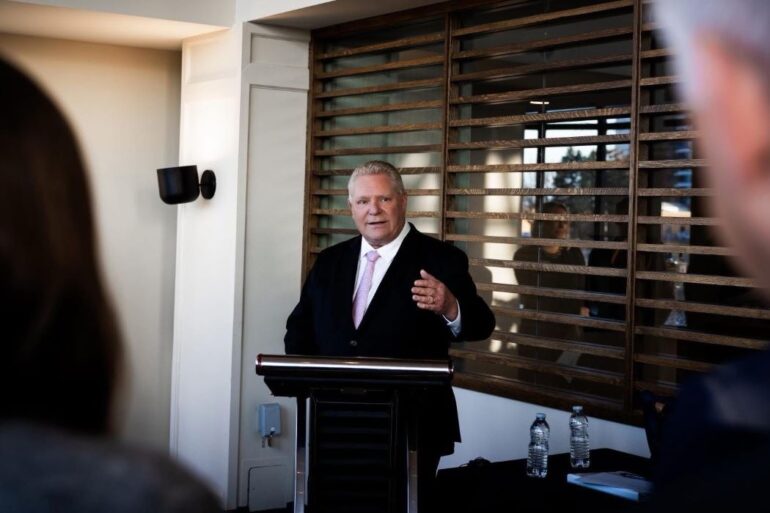When the North American trade war kicked off at the beginning of March, Ontario Premier Doug Ford announced from behind a podium labelled “Canada is not for sale” that all United States (US)-based companies were banned from taking part in provincial procurement as part of retaliatory measures. New details shared by the province now show that’s not entirely true.
The province’s new Procurement Restriction Policy, which says it is designed to restrict US businesses from accessing public sector procurements in Ontario, actually defines a US business as a supplier, manufacturer, or distributor that has its headquarters or main office in the US, and has fewer than 250 full-time employees in Canada at the time of the procurement process.
Companies that have already been authorized to do business with the province could continue to do so.
This means that, technically, a US-based company can still earn the business of the province despite Ford declaring “all” US-based companies barred from the process. The policy also states that procuring from a US business not covered by the above exceptions is only allowed when it is the only viable source for the good or service and the procurement cannot be delayed.
“Ontario will continue to use domestic producers and suppliers in the province and across the country,” a spokesperson at Ontario’s Treasury Board Secretariat told BetaKit in an email statement following publication. The spokesperson added that the province will only consider alternative solutions in circumstances where there is no available option in Canada.
“The Procurement Restriction Policy minimizes economic harm to Ontario and Canada, and is aligned with the Ontario business definition under the Building Ontario Businesses Initiative (BOBI),” the spokesperson said.
BOBI defines that an Ontario business has its headquarters or main office in Ontario, or has at least 250 employees in the province.
The policy applies to all new procurements of public sector entities, including all ministries, provincial agencies, Ontario Power Generation, and the Independent Electricity System Operator. When he announced the retaliatory measure last month, Ford claimed that the province and its agencies spend about $30 billion on procurement per year, not including its $200-billion infrastructure plan.
Ford also indicated last month that the restrictions could also affect American companies currently doing business with the province, which now doesn’t seem to be the case.
While he also said at that time that he asked the provincial public service and as his ministers to go through contracts “with a fine tooth comb.”
“No matter if it’s services through the tech sector, or any other products, we need to stop immediately, and if they come to sue us, so be it,” he said then.
However, the Procurement Restriction Policy says it does not apply when public sector entities use existing Vendor of Record arrangements (VORs), meaning companies that have already been authorized to do business with the province could continue to do so.
Ford has already been asked by 75 Ontario-based CEOs to prioritize provincial resources, such as procurement, for homegrown innovation in an open letter put forward by the Council of Canadian Innovators (CCI) last month.
When the province went ahead with subsidizing a new research and development center from German multinational technology conglomerate Siemens, CCI Ontario affairs director Skaidra Puodžiūnas said that “every dollar funnelled to foreign entities is a missed opportunity” to advance Ontario’s prosperity, a phrase she is now repeating.
“The reality is, if the Ontario government truly wants to support homegrown innovators, policies can’t be made in reaction to the latest round of US tariffs, it has to be a more strategic and long-term focus,” Puodžiūnas said.
Puodžiūnas said CCI is calling on the province to expand the mandate of Supply Ontario, the agency behind procurement, to prioritize homegrown technology solutions and ensure public sector procurement strengthens domestic firms. She added that the industry group would also like to see Ontario prohibit proposal requests that name foreign-owned technology vendors, and launch a review of non-Canadian technology contracts to determine where domestic alternatives should be prioritized.
The Ontario government announced some tariff-relief measures for Ontario businesses this week, though they mostly do not affect the tech sector. The measures include deferring 10 provincially administered taxes for six months starting on April 1, 2025, which the province claimed would give businesses approximately $9 billion worth of cash flow to keep workers employed and weather the economic turmoil. Deferred tax programs include the Employer Health Tax, Insurance Premium Tax, and the Retail Sales Tax on Insurance Contracts and Benefit Plans. The Workplace Safety and Insurance Board is also issuing a $2-billion rebate for employers as part of the relief measures.
UPDATE (04/09/2025): This story has been updated with commentary from a spokesperson at Ontario’s Treasury Board Secretariat.
Feature image courtesy Doug Ford via LinkedIn.


